A review of every liquid multi fuel camping stove on the market. 28 different multi-fuel stoves compared.
Also, a guide to all the different types of fuel available and their various names.
Updated February 2020
Contents
Guide to Different Types of Fuel
INTRODUCTION
What are liquid multi fuel stoves?
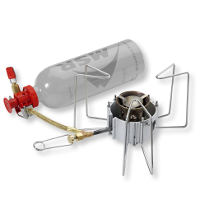
Multifuel stoves are small, lightweight cookers designed for camping or backpacking. They burn a variety of liquid fuels such as the unleaded petrol/gasoline you put in your car, clean white gas you buy from camping stores and old fashioned kerosene (aka “jet fuel”). Some of them can also use butane/propane canisters (aka “camping gas”).
Multifuel stoves have two key advantages over regular camping gas stoves: first, their versatility makes it easier to find usable fuel wherever you are in the world (everywhere has unleaded petrol/gasoline). Second, in contrast to camping gas, they work well in cold temperatures so are useful for high mountains and polar environments.
Multi fuel stoves are also known as liquid fuel stoves, liquid multi fuel stoves, dual fuel stoves and petrol stoves. They are not to be confused with gas stoves or canister stoves – a full review of which can be found in a Comparison of Gas Canister Camping Stoves.
Here are some explanations of multi-fuel stove features:
Simmering
It is possible to adjust the heat output of all the stoves to some extent i.e. from full power to lower heat. This is usually done by turning a dial/valve which controls the amount of fuel that comes out of the bottle. However, some stoves have a second valve on the base of the burner itself which allows fine tuned simmering. This is useful for conserving fuel and any cooking more complicated than just boiling water. Finally, any stove using gas canisters will be able to simmer.
Nozzles
Multi fuel stoves have traditionally required you to change a part every time you change fuels. Specifically, a small nozzle inside the stove through which the fuel exits before burning. It’s easily done but can be a little fiddly at night, in bad weather and wearing gloves. Some newer models of multi fuel stove have found a way to burn the multiple fuels through a single nozzle. This just makes your life a little easier. Nozzles are variously known as jets, nipples and valves too.
Types of Fuel
There’s a detailed guide at the bottom of the post here.
This Review
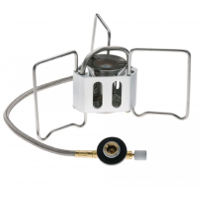
This review is part of a series of comparison articles. It has two aims:
- Aim #1: provide the most comprehensive list of liquid multi fuel stoves anywhere on the internet.
- Aim #2: present objective facts and details so you can choose the best stove for yourself (rather than me just giving my opinion).
If you know of any stove I have missed from my list then please do let me know and if you find the review useful (or even if you don’t) then please do add a comment below.
Thanks for reading, Tim.
COMPARISON TABLE
The Ultimate Multi-Fuel Stove Comparison Table
W = white fuel, U = unleaded petrol, K = kerosene, D = disesel, C = canister (butane/propane gas)
| # | Brand | Stove | Weight | Ounces | Boil time | W | U | K | D | C | Simmer | Nozzles | Features | Cost | Price check |
|---|---|---|---|---|---|---|---|---|---|---|---|---|---|---|---|
| 1 | Primus | Multifuel III | 436g | 15oz | 3.6 mins | Y | Y | Y | Y | Y | Y | 3 | Burns all fuel types | £143 | Amazon – UK shops |
| 2 | Primus | OmniFuel II | 441g | 16oz | 3.0 mins | Y | Y | Y | Y | Y | Y | 3 | Burns all fuel types | £171 | Amazon – UK shops |
| 3 | Primus | OmniLite Ti | 340g | 12oz | 3.5 mins | Y | Y | Y | Y | Y | Y | 3 | Burns all fuel types | £150 | Amazon – UK shops |
| 4 | MSR | Whisperlite | 410g | 15oz | 3.9 mins | Y | N | N | N | N | N | 1 | ShakerJet cleaner | £119 | Amazon – REI – UK shops |
| 5 | MSR | WhisperLite International | 441g | 16oz | 3.5 mins | Y | Y | Y | N | N | N | 2 | ShakerJet cleaner | £105 | Amazon – REI – UK shops |
| 6 | MSR | WhisperLite Universal | 549g | 19oz | 3.5 mins | Y | Y | Y | N | Y | N | 3 | ShakerJet cleaner | £153 | Amazon – REI – UK shops |
| 7 | MSR | DragonFly | 510g | 18oz | 3.5 mins | Y | Y | Y | Y | N | Y | 2 | ShakerJet cleaner | £139 | Amazon – REI – UK shops |
| 8 | MSR | XGK-EX Expedition Stove | 489g | 17oz | 3.5 mins | Y | Y | Y | Y | N | N | 2 | ShakerJet cleaner | £151 | Amazon – REI – UK shops |
| 9 | Optimus | Nova | 460g | 16oz | 3.5 mins | Y | Y | Y | Y | N | Y | 1 | Magnet cleaner, one nozzle | £117 | Amazon – REI – UK shops |
| 10 | Optimus | Nova+ (Plus) | 430g | 15oz | 3.5 mins | Y | Y | Y | Y | N | Y | 1 | Magnet cleaner, one nozzle | £127 | Amazon – REI – UK shops |
| 11 | Optimus | Polaris Optifuel | 475g | 17oz | 3.4 mins | Y | Y | Y | Y | Y | Y | 1 | All fuels through one nozzle | £165 | Amazon – REI – |
| 12 | Kovea | Booster Dual Max | 434g | 15oz | 3.5 mins | Y | N | N | N | N | N | 1 | £157 | Amazon – REI – | |
| 13 | Kovea | Booster+1 | 530g | 19oz | 3.3 mins | Y | N | Y | N | Y | N | 1 | £96 | Amazon – REI – UK shops | |
| 14 | Kovea | Hydra | 422g | 15oz | 3.5 mins | Y | N | N | N | Y | N | 1 | Low noise | Amazon – REI – UK shops | |
| 15 | Edelrid | Hexon Multifuel | 330g | 12oz | 3.1 mins | Y | Y | Y | Y | Y | N | 1 | All fuels through one nozzle | £140 | Amazon – UK shops |
| 16 | Soto | Muka Stove (OD-1NP) | 333g | 12oz | 3.0 mins | Y | Y | N | N | N | Y | 1 | No priming required | £119 | Amazon – UK shops |
| 17 | Coleman | Sportster II | 878g | 31oz | 4.0 mins | Y | Y | N | N | N | N | 1 | All-in-one stove | £99 | Amazon – |
| 18 | Optimus | Hiker Plus | 1600g | 56oz | 3.5 mins | Y | Y | Y | Y | N | Y | 1 | All-in-one stove | £231 | Amazon – UK shops |
| 19 | Optimus | Svea 123R | 550g | 19oz | 4.0 mins | Y | Y | N | N | N | N | 1 | All-in-one stove | £104 | Amazon – UK shops |
| 20 | Primus | Multifuel Kits | 236g | 8oz | 3.5 mins | Y | Y | Y | N | Y | N | 3 | Converts gas stoves to multifuel | £54 | Amazon – UK shops |
| 21 | Trangia | Multifuel X2 | 525g | 18oz | 3.5 mins | Y | Y | Y | Y | Y | Y | 2 | Converts Trangia to multifuel | £151 | Amazon – UK shops |
| 22 | Tomtop | Portable Multi Fuel | 575g | 20oz | Y | Y | N | N | Y | £50 | Amazon – UK shops |
W = white fuel, U = unleaded petrol, K = kerosene, D = disesel, C = canister (butane/propane gas)
- Weight: stove and pump combined, does not include fuel bottles (except on all-in-one stoves) or accessories (e.g. windshield).
- Boil time: manufacturer’s reported time taken to boil 1-litre (one quart) of water using white gas.
- Fuels: for an explanation of the different fuel types, see below.
- Simmer: you can control the output to some extent on all stoves but some have a second, separate controls on the base of the unit for fine tuning.
- Nozzles: Some stoves require you to change nozzles to burn different types of fuel. It’s easier if it has just 1 nozzle. (Also called nipples, jets and valves).
[one_sixth]–[/one_sixth]
[two_third]
[vc_message message_box_style=”standard” style=”rounded” message_box_color=”info” icon_type=”fontawesome” icon_fontawesome=”fa fa-info-circle” icon_openiconic=”vc-oi vc-oi-dial”]
Buying online?
If you decide to buy a stove after reading this article, please do consider using one of my links.
If you do, at no cost to you, I will get a small percentage of whatever you buy.
Amazon.co.uk | Amazon.com | Alpine Trek | Blacks | Cotswold | eBay | GO Outdoors | REI | Wiggle | AllOutdoor
[/vc_message]
[/two_third]
[one_sixth_last]–[/one_sixth_last]
BEST LIQUID MULTI FUEL STOVES
Lightest Multi Fuel Stoves
[one_third]
(330g / 12oz)
[/one_third]
[one_third]
(340g / 12oz)
[/one_third]
[one_third_last]
(333g / 12oz)
[/one_third_last]
Cheapest Multi Fuel Stoves
[one_third]
(£84)
[/one_third]
[one_third]
(£105)
[/one_third]
[one_third_last]
(£56)
[/one_third_last]
Burn the Most Types of Fuel
[one_third]
(all types except alcohol)
[/one_third]
[one_third]
(all types plus alcohol)
[/one_third]
[one_third_last]
(all types without changing jets)
[/one_third_last]
Specialist multi-fuel stoves
Stove you don’t need to prime:
All-in-one stoves with built-in fuel containers:
Coleman Sportster II, Optimus Hiker Plus and Svea123r.
Stoves you don’t need to change nozzles:
Optimus Nova / Polaris, Kovea Hydra / Booster+1, Edelrid Hexon, Soto Muka and ATG.
Stove with best reputation for toughness:
Author’s favourite stove:
MULTI FUEL STOVE REVIEWS
Detailed reviews of individual multi-fuel stoves
1, 2 & 3. Primus MultiFuel, OmniFuel & OmniLite Ti
Summary: excellent, reliable stoves that burn more fuel types than any other.
I have cleaned, serviced, re-built and operated dozens of Primus Omnifuels whilst working for British Exploring and used an OmniLite on my round-the-world cycle.
Until the release of the Optimus Polaris, the Primus multifuel stoves were the only ones that can really burn all types of liquid fuel (although see the Trangia X2 too). The others are either let down by diesel or butane/propane canisters. The Omnifuel has also been around for many years and is well tried, tested and loved. The OmniLite Ti is just a slightly smaller, lighter version made from titanium (read my full review of it here).
The latest version of the Multifuel range is the Multifuel III – which I haven’t tested. Previous versions included the Multifuel EX and Multifuel II. It is very similar to the Omnifuel, the latest edition of which is called the Omnifuel II. The key differences with the Omnifuel II over previous versions are more clearly labelled fuel nozzles and the ability to attach them to the legs of the stove, as well pot supports that lock in position and fold away into a smaller size.
These are excellent all-round multifuel stoves and hard to beat. Their only downsides are having to change between the three different nozzles depending on fuel (which you don’t with Optimus and Kovea stoves) and not having an built-in jet cleaner (like MSR, Optimus and ATG).
[one_fourth]
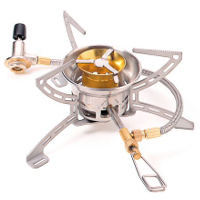
[/one_fourth]
[one_half]
Weight: 436g (15oz), 441g (16oz), 340g (12oz)
Boiling time: 3.6 mins, 3.0 mins, 3.5 mins
Simmers: Yes
Need to change nozzles: Yes
Can burn: All of them (white gas, unleaded petrol/gasoline, kerosene, diesel, butane/propane canisters)
Can’t burn: Alcohol (click for fuel guide)
[/one_half]
[one_fourth_last]
Automatic price checker:
[button color=”green” link=”https://amzn.to/2CjXUFz” target=”_blank” size=”big” fontw=”bold” align=”center” radius=”6″]Check Amazon ➜[/button]
[button color=”blue” link=”https://www.alpinetrek.co.uk/s/primus–multifuel/?searchparam=primus%20multifuel&iBfResetSorting=1&userInput=primus%20multifuel” target=”_blank” size=”big” fontw=”bold” align=”center” radius=”6″]Check UK shops ➜[/button]
[/one_fourth_last]
4, 5 & 6. MSR WhisperLite, International & Universal
Summary: good, reliable, simple stoves with no simmer controls.
MSR make the best known and most popular multifuel stoves in the world. The three Whisper Lite stoves are the simplest of their five multi fuel offerings. Most notably, they don’t have a second valve control on the stove which means it’s hard to control the heat output limiting your ability to simmer.
The basic WhisperLite only burns clean white fuel so is really only useful if you don’t want to use gas canisters, for example if it’s cold. The WhisperLite International also takes unleaded petrol/gasoline and kerosene which makes it much better for travelling (hence “international”) and the WhisperLite Universal takes gas canisters too. You’ll need to switch nozzles to burn the different fuels though.
Like all MSR stoves, the WhisperLite range all have ‘ShakerJets’ – which allow the stove to self-clean its nozzle by tipping it upside down or shaking it.
They’re good if you just want an on/off stove for melting snow and boiling water. But if you want to do any more varied cooking then just get a DragonFly or try Primus and Optimus stoves.
[one_fourth]
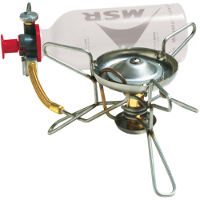
[/one_fourth]
[one_half]
Weight: 410g (15oz), 441g (16oz), 549g (19oz)
Boiling time: 3.9 mins, 3.5 mins, 3.5 mins
Simmers: Minimal
Need to change nozzles: No
Whisperlite burns:White gas only (click for fuel guide)
International burns: White gas, unleaded petrol/gasoline, kerosene (no diesel or canisters)
Universal burns: White gas, unleaded petrol/gasoline, kerosene, butane/propane canisters (no diesel)
[/one_half]
[one_fourth_last]
Automatic price checker:
[button color=”blue” link=”http://bit.ly/2EAkI6v” target=”_blank” size=”big” fontw=”bold” align=”center” radius=”6″]Check REI ➜[/button]
[button color=”green” link=”https://amzn.to/2BqUQpF” target=”_blank” size=”big” fontw=”bold” align=”center” radius=”6″]Check Amazon ➜[/button]
[button color=”blue” link=”https://www.alpinetrek.co.uk/s/msr–whisperlite/?searchparam=msr%20whisperlite&iBfResetSorting=1&userInput=msr%20whisperlite” target=”_blank” size=”big” fontw=”bold” align=”center” radius=”6″]Check UK shops ➜[/button]
[/one_fourth_last]
7. MSR DragonFly
Summary: good, reliable stove with simmer control.
The MSR DragonFly is very similar to the WhisperLite International. The key differences are that the DragonFly has the second fuel valve on the stove allowing for easy simmering and it can also burn diesel. As a result, it’s a tiny bit heavier and more expensive.
[one_fourth]

[/one_fourth]
[one_half]
Weight: 510g (18oz)
Boiling time: 3.5 mins
Simmers: Yes
Need to change nozzles: Yes
Can burn: White gas, unleaded petrol/gasoline, kerosene, diesel
Can’t burn: Butane/propane canisters, alcohol (click for fuel guide)
[/one_half]
[one_fourth_last]
Automatic price checker:
[button color=”blue” link=”http://bit.ly/2Er1eQC” target=”_blank” size=”big” fontw=”bold” align=”center” radius=”6″]Check REI ➜[/button]
[button color=”green” link=”https://amzn.to/2R1sBYl” target=”_blank” size=”big” fontw=”bold” align=”center” radius=”6″]Check Amazon ➜[/button]
[button color=”blue” link=”http://tinyurl.com/y74hpnba” target=”_blank” size=”big” fontw=”bold” align=”center” radius=”6″]Check UK shops ➜[/button]
[/one_fourth_last]
8. MSR XGK EX Expedition Stove
Summary: tough, reliable stove that burns most fuels, popular in cold weather but loud and no simmer.
The XGK Expedition Stove is known for being tough and reliable, and is the number one choice for polar and high altitude mountaineering expeditions. It burns all types of fuel except for gas canisters but does not simmer unless you buy a separate simmer plate.
[one_fourth]
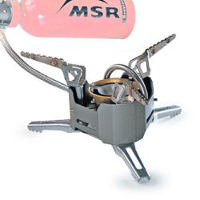
[/one_fourth]
[one_half]
Weight: 489g (17oz)
Boiling time: 3.5 mins
Simmers: No (unless you buy a simmer plate)
Need to change nozzles: Yes (2)
Can burn: White gas, unleaded petrol/gasoline, kerosene, diesel
Can’t burn: Butane/propane canisters, alcohol (click for fuel guide)
[/one_half]
[one_fourth_last]
Automatic price checker
[button color=”blue” link=”http://bit.ly/2EBgUld” target=”_blank” size=”big” fontw=”bold” align=”center” radius=”6″]Check REI ➜[/button]
[button color=”green” link=”https://amzn.to/2BqUQpF” target=”_blank” size=”big” fontw=”bold” align=”center” radius=”6″]Check Amazon ➜[/button]
[button color=”blue” link=”http://tinyurl.com/y6w2rval” target=”_blank” size=”big” fontw=”bold” align=”center” radius=”6″]Check UK shops ➜[/button]
[/one_fourth_last]
9 & 10. Optimus Nova & Nova Plus
Summary: burn multiple fuels through one nozzle.
Optimus stoves have been around for a long time (they used to be called Brunton in the US) and have built up a good reputation. They recalled some stoves in 2010 that weren’t up to their usual standards but that was some years ago now.
The Optimus Novas are very good on paper: they burn all fuel types except for gas canisters and they do so using a single nozzle. In other words, you can switch between burning white fuel, diesel and unleaded petrol/gasoline without having to change nozzles. They also have a magnetic nozzle cleaner which allows you to clean even while the stove is still burning.
The main difference between the Nova and Nova+ is that the latter has a temperature control valve built into the fuel line which makes it a bit smaller and lighter.
[one_fourth]
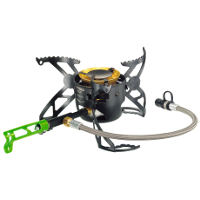
[/one_fourth]
[one_half]
Weight: 460g (16oz) / 430g (15oz)
Boiling time: 3.5 mins
Simmers: Yes
Need to change nozzles: No
Can burn: White gas, unleaded petrol/gasoline, kerosene and diesel
Can’t burn: Butane/propane canisters
[/one_half]
[one_fourth_last]
Automatic price checker:
[button color=”blue” link=”http://bit.ly/2A4nxIQ” target=”_blank” size=”big” fontw=”bold” align=”center” radius=”6″]Check REI ➜[/button]
[button color=”green” link=”https://amzn.to/2BvKdC2″ target=”_blank” size=”big” fontw=”bold” align=”center” radius=”6″]Check Amazon ➜[/button]
[button color=”blue” link=”https://www.alpinetrek.co.uk/brands/optimus/” target=”_blank” size=”big” fontw=”bold” align=”center” radius=”6″]Check UK shops ➜[/button]
[/one_fourth_last]
11. Optimus Polaris
Summary: burns all fuels through a single nozzle.
Optimus release the Polaris Optifuel in 2015 and sent me a pre-release version to test out. You can see my full review here.
The remarkable thing about the Polaris is that it burns all liquid fuel types, including butane/propane canisters, through one nozzle. In other words, you can switch between, say, diesel and a butane canister without having to change the jet.
The only other stove that can burn canisters and liquid fuels through the same nozzle is the ultralight Edelrid Hexon. This is genuinely quite innovative and feels like a gauntlet has been thrown down to other manufacturers to emulate this ability.
[one_fourth]
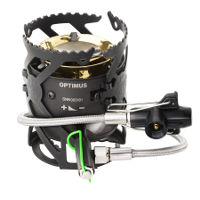
[/one_fourth]
[one_half]
Weight: 475g (17oz)
Boiling time: 3.4 mins
Simmers: Yes
Need to change nozzles: No
Can burn: All of them (white gas, unleaded petrol/gasoline, kerosene, diesel, butane/propane canisters) (click for fuel guide)
Can’t burn: Alcohol
[/one_half]
[one_fourth_last]
Automatic price checker:
[button color=”blue” link=”http://bit.ly/2A4nxIQ” target=”_blank” size=”big” fontw=”bold” align=”center” radius=”6″]Check REI ➜[/button]
[button color=”green” link=”https://amzn.to/2BqV4gv” target=”_blank” size=”big” fontw=”bold” align=”center” radius=”6″]Check Amazon ➜[/button]
[/one_fourth_last]
12, 13, 14. Kovea Booster Dual Max, Booster+1 & Hydra
Summary: simple, lightweight stoves for clean fuels only.
Kovea are a Korean company that I first came across when cycling through South Korea in 2014. They have recently arrived in the UK courtesy of Mercator Gear.
Their stoves are very simple and thus lightweight – the Hydra and Dual Max are two of the lightest available, beaten only by Edelrid’s Hexon (some of whose parts are actually made by Kovea) and Primus OmniLite Ti. The Hydra also has a special “noise reducer”. They only burn the clean fuels – white fuel and butane/proper canisters but at least do so through one nozzle. No simmering.
[one_fourth]
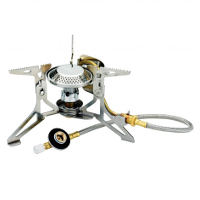
[/one_fourth]
[one_half]
Weight: 434g (15oz), 530g (19oz), 422g (15oz)
Boiling time: 3.5, 3.3, 3.5 minutes
Simmers: No
Need to change nozzles: No
Dual Max burns: White gas, unleaded petrol/gasoline (no kerosene, diesel, canisters) (click for fuel guide)
Booster+1 & Hydra burn: White gas, butane/propane canisters (no unleaded, kerosene or diesel)
[/one_half]
[one_fourth_last]
Automatic price checker:
[button color=”blue” link=”http://bit.ly/2A4cek9″ target=”_blank” size=”big” fontw=”bold” align=”center” radius=”6″]Check REI ➜[/button]
[button color=”green” link=”https://amzn.to/2LoKBGJ” target=”_blank” size=”big” fontw=”bold” align=”center” radius=”6″]Check Amazon ➜[/button]
[/one_fourth_last]
15. Edelrid Hexon Multifuel
Summary: ultralight, minimalist stove that burns all fuel types through a single nozzle.
Edelrid are a German company. Their Hexon Multifuel Stove is one of the lightest liquid fuel stoves available. However, it’s often listed as weighing 220g (8oz) but this weight does not include the pump. The total weight is actually 330g (12oz) but it’s still the lightest multi-fuel stove on the market.
It also burns all the fuel types through a single nozzle, a feat matched only by the new Polaris Optifuel from Optimus. I’ve not had the privilege of testing one myself but, on paper, this is a remarkable stove.
[one_fourth]

[/one_fourth]
[one_half]
Weight: 330g (12oz)
Boiling time: 3.1 mins
Simmers: No
Need to change nozzles: No
Can burn: White gas, unleaded petrol/gasoline, kerosene, diesel, butane/propane canisters
Can’t burn: Alcohol (click for fuel guide)
[/one_half]
[one_fourth_last]
Automatic price checker:
[button color=”green” link=”https://amzn.to/2S3lYlz” target=”_blank” size=”big” fontw=”bold” align=”center” radius=”6″]Check Amazon ➜[/button]
[button color=”blue” link=”https://www.alpinetrek.co.uk/edelrid-hexon-multifuel-multifuel-stove/” target=”_blank” size=”big” fontw=”bold” align=”center” radius=”6″]Check UK shops ➜[/button]
[/one_fourth_last]
16. Soto Muka Stove
Summary: lightweight multifuel stove and the only one that doesn’t require priming.
Read my full review of the Soto Muka here
The Soto Muka is the only multi fuel stove that you can start without priming first. You don’t have to leak a little liquid fuel, light it and wait for the stove to warm before you start.
Instead, they’ve developed a clever system that puts the whole process into the fuel valve: you turn it halfway to light the stove, count to 10 then turn it further to keep cooking. That means it is quicker, easier and much cleaner to use than any of the other stoves here.
Otherwise the stove is simple and lightweight but has no simmer and only burns white fuel and unleaded petrol/gasoline.
[one_fourth]
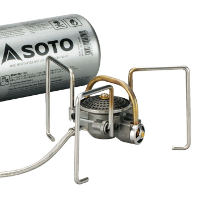
[/one_fourth]
[one_half]
Weight: 333g (12oz)
Boiling time:
Simmers: No
Need to change nozzles:
Can burn: White gas, unleaded petrol/gasoline (click for fuel guide)
Can’t burn: Kerosene, diesel, butane/propane canisters, alcohol
[/one_half]
[one_fourth_last]
Automatic price checker:
[button color=”green” link=”https://amzn.to/2QE52Wh” target=”_blank” size=”big” fontw=”bold” align=”center” radius=”6″]Check Amazon ➜[/button]
[button color=”blue” link=”https://basecampfood.com/products/soto-muka-petrol-stove” target=”_blank” size=”big” fontw=”bold” align=”center” radius=”6″]Check UK shops ➜[/button]
[/one_fourth_last]
17. Coleman Sportster II
Summary: big and heavy but very cheap. Best used from a vehicle or base camp.
The Coleman Sportster II is different from the other stoves in that it does not have a separate fuel bottle. Instead, the stove is mounted directly on top of a fuel container with the effect that it looks more like a top-mounted gas stove.
It’s not the fastest, a little chunky and notably heavier than the rest but is solid and less fiddly than the usual design. For a multifuel stove, it is very cheap. Probably not ideal for carrying in a rucksack or pannier but good on a vehicle or at a basecamp.
[one_fourth]
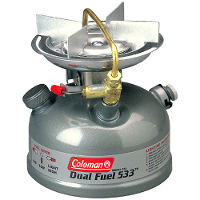
[/one_fourth]
[one_half]
Weight: 878g (31oz)
Boiling time: 4.0 mins
Simmers: No
Need to change nozzles: No
Can burn: White gas, unleaded petrol/gasoline (click for fuel guide)
Can’t burn: Kerosene, diesel, butane/propane canisters, alcohol
[/one_half]
[one_fourth_last]
Automatic price checker:
[button color=”green” link=”https://amzn.to/2CleIMq” target=”_blank” size=”big” fontw=”bold” align=”center” radius=”6″]Check Amazon ➜[/button]
[button color=”blue” link=”http://tidd.ly/f78fb4d1″ target=”_blank” size=”big” fontw=”bold” align=”center” radius=”6″]Check UK shops ➜[/button]
[/one_fourth_last]
18. Optimus Hiker Plus
Summary: a classic all-in-one stove that’s big, heavy and reliable.
The Optimus Hiker+ is a classic stove. It’s another all-in-one unit that’s even bigger and heavier than Coleman Sportster II. Again, not great for carrying on your back or bike but a solid unit when you have a static camp or vehicle to transport it. Plus, it looks really cool.
[one_fourth]
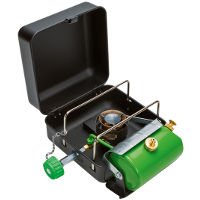
[/one_fourth]
[one_half]
Weight: 1.6kg (3.5lb)
Boiling time: 3.5 mins
Simmers: Yes?
Need to change nozzles: No
Can burn: White gas, unleaded petrol/gasoline, kerosene, diesel
Can’t burn: Butane/propane canisters, alcohol (click for fuel guide)
[/one_half]
[one_fourth_last]
Automatic price checker:
[button color=”green” link=”https://amzn.to/2BpYtvW” target=”_blank” size=”big” fontw=”bold” align=”center” radius=”6″]Check Amazon ➜[/button]
[button color=”blue” link=”https://www.alpinetrek.co.uk/brands/optimus/” target=”_blank” size=”big” fontw=”bold” align=”center” radius=”6″]Check UK shops ➜[/button]
[/one_fourth_last]
19. Optimus Svea 123R
Summary: a 60-year old classic that’s ultra reliable and surprisingly light.
The Optimus Svea 123r was originally introduced in 1955 so has a long history and a cult following to suit. One reason it is loved so dearly is because, in contrast to the modern ultra-light stoves with fiddly parts, the Svea is reassuringly solid and simple. It has a reputation for reliability.
Despite it’s apparent bulk, it is the lightest of the all-in-one stoves. The stated weight (550g, 19oz) includes a cooking pot and, of course, the fuel container which is not included the weights reported above. As such, it’s no heavier than many modern multi fuel stoves. Also, unusually for a manufacturer’s own reporting, the lengthy 7-minute boil time for a litre (quart) of water, seems to be considerably longer than some users report. Others suggest it is closer to 4 minutes.
[one_fourth]
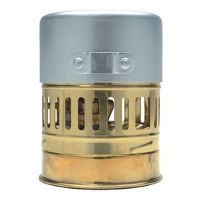
[/one_fourth]
[one_half]
Weight: 550g (19oz)*
Boiling time: 7.0 mins
Simmers: No
Need to change nozzles: No
Can burn: White gas, unleaded petrol/gasoline
Can’t burn: Kerosene, diesel, Butane/propane canisters, alcohol (click for fuel guide)
[/one_half]
[one_fourth_last]
Automatic price checker:
[button color=”green” link=”https://amzn.to/2BqNhzc” target=”_blank” size=”big” fontw=”bold” align=”center” radius=”6″]Check Amazon ➜[/button]
[button color=”blue” link=”https://www.alpinetrek.co.uk/brands/optimus/” target=”_blank” size=”big” fontw=”bold” align=”center” radius=”6″]Check UK shops ➜[/button]
[/one_fourth_last]
20. Primus Multifuel Kits
Summary: converts your Primus gas burner into a multifuel stove.
Primus offer a range of multifuel conversion kits for their gas burning stoves. Specifically, there are kits for the Eta Power, Eta Spider, Eta Express and Gravity gas stoves. The kits allow the stoves to burn white gas, unleaded petrol/gasoline and kerosene as well as their usual butane/propane canisters.
If you want a multifuel stove then you’re probably better just getting a multifuel stove. However, these might be good if you already have one of the stoves, particularly like the Primus range (some of them have clever wind shields and heat sinks for more efficient cooking) or want the option of a simple gas stove sometimes.
[one_fourth]
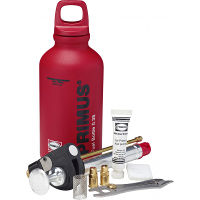
[/one_fourth]
[one_half]
Weight: ~326g (8oz) plus weight of stove
Boiling time: ~3.5 mins
Simmers: No
Need to change nozzles: Yes (3)
Can burn: White gas, unleaded petrol/gasoline, kerosene, butane/propane canisters
Can’t burn: Diesel, alcohol (click for fuel guide)
[/one_half]
[one_fourth_last]
Automatic price checker:
[button color=”green” link=”https://amzn.to/2LnlbJM” target=”_blank” size=”big” fontw=”bold” align=”center” radius=”6″]Check Amazon ➜[/button]
[button color=”blue” link=”https://www.alpinetrek.co.uk/s/primus–multifuel/?searchparam=primus%20multifuel&iBfResetSorting=1&userInput=primus%20multifuel” target=”_blank” size=”big” fontw=”bold” align=”center” radius=”6″]Check UK shops ➜[/button]
[/one_fourth_last]
21. Trangia X2 Multifuel Burner
Summary: converts your Trangia stove into a multi-fuel cooker. Great if you like Trangias, not if you don’t.
The regular Trangia stoves are alcohol burners. They are are fool proof, wind proof and very reliable but mind bogglingly slow and with no temperature control at all. They’re often used by youth groups as they’re so simple and considered safer. They are adored by millions and loathed by about the same amount.
The X2 Multfuel Burner allows you to burn all types of liquid fuel through the regular Trangia base and windshield. If you carry the original Trangia burner too then this combination is the only stove that will burn all liquid fuels, including alcohol. And, if you’re a Trangia fan, then you may love being able to convert your trusty burner. However, for most people, this would be a large, expensive and heavy route to burning petrol.
[one_fourth]
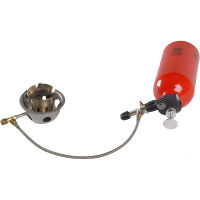
[/one_fourth]
[one_half]
Weight: 525g (18oz) plus weight of original Trangia stove
Boiling time: 3.5 mins
Simmers: Yes
Need to change nozzles: Yes (2)
Can burn: White gas, unleaded petrol/gasoline, kerosene, diesel, butane/propane canisters (and alcohol with original Trangia burner)
Can’t burn: Nothing.
[/one_half]
[one_fourth_last]
Automatic price checker:
[button color=”green” link=”https://amzn.to/2QAhshE” target=”_blank” size=”big” fontw=”bold” align=”center” radius=”6″]Check Amazon ➜[/button]
[button color=”blue” link=”https://www.alpinetrek.co.uk/trangia-multifuel-x2-multifuel-stove/” target=”_blank” size=”big” fontw=”bold” align=”center” radius=”6″]Check UK shops ➜[/button]
[/one_fourth_last]
Rare and discontinued stoves
The following stoves are either only available in certain countries or have been discontinued. They are included here for reference and to save people Googling them forever.
W = white fuel, U = unleaded petrol, K = kerosene, D = disesel, C = canister (butane/propane gas)
| Brand | Stove | Weight | Ounces | Boil time | W | U | K | D | C | Simmer | Nozzles | Features |
|---|---|---|---|---|---|---|---|---|---|---|---|---|
| ATG | Multi-Fuel Stove | 480g | 17oz | 3.0 mins | Y | Y | Y | N | Y | N | 1 | Shaker jet, South Africa only |
| Pinguin | Pyro | Y | Y | N | N | Y | N | Czech Republic only | ||||
| Go System | Gemini Extreme | 300g | 11oz | 3.2 mins | Y | Y | N | N | Y | N | 1 | No longer produced |
| Go System | FlexiFuel | 464g | 16oz | 4.8 mins | Y | Y | N | N | Y | No longer produced | ||
| Markill | Phoenix | 426g | 15oz | 3.3 mins | No longer produced | |||||||
| Coleman | Pulstar | 467g | 16oz | 4.3 mins | Y | Y | N | N | N | Y | 1 | No longer produced |
W = white fuel, U = unleaded petrol, K = kerosene, D = disesel, C = canister (butane/propane gas)
ATG Multi-Fuel Stove
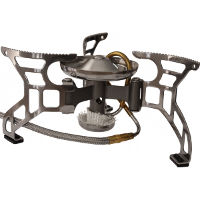
ATG are a reasonably new company based in South Africa. They say they’ve designed their multifuel stove (which used to be known as the ‘Jiko’ multi fuel stove) for the tough conditions of Africa. It certainly looks good on paper: burning all fuel types except diesel through a single nozzle and with a built-in shaker jet ala MSR.
You can’t buy them outside of South Africa but ATG say they will ship internationally. Details here.
Go System Gemini Extreme
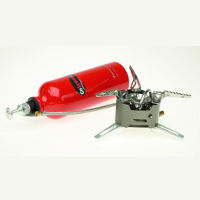
I’ve not used this stove myself, there is very little information about it online and GoSystems aren’t replying to my emails. On paper, the stove looks great – very light and, apparently, burns multiple fuels through a single nozzle whilst being one of the cheapest stoves on the list.
It also looks uncannily like the MSR XGK-EX. Reviews I’ve read online suggest that it is poorly designed and does not function well. I suspect it is no longer in production although it is still available from some stores online.
Pinguin Pyro
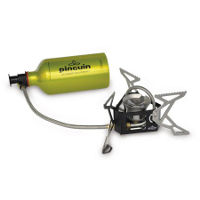
The Pyro is/was a multi fuel stove made in the Czech Republic. However, Pinguin have never replied to my emails and the Pyro no longer seems to be listed on their website.
TYPES OF FUEL
I have categorised six different types of fuel: white gas, unleaded petrol/gasoline, kerosene, diesel, butane/propane canisters and alcohol.
1. White Gas
[one_third]
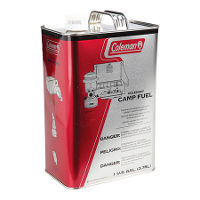
[/one_third]
[one_third]
White gas is short for white gasoline (so is actually a liquid, not a gas) and is also known as white fuel or naphtha. White gas is just a cleaner version of unleaded petrol or gasoline. It will burn burn with the same heat but be cleaner (i.e. leave less black mess on your stove).
Coleman Fuel, Optimus Arctic Fuel and MSR Super Fuel are similar to white gas only with added ingredients which make them safer and less volatile. Aspen 4 lawn mower fuel is apparently very similar to these specific camping stove fuels only much cheaper.
[/one_third]
[one_third_last]
Other names / similar to:
White gas, white fuel, naphtha/naptha, camping fuel, Coleman Fuel, Optimus Arctic Fuel, MSR Super Fuel, Aspen 4, lighter fluid, lighter fuel. (Not white spirit).
Buy from:
Outdoor/camping shops and some hardware stores.
[/one_third_last]
2. Unleaded Petrol/Gasoline
[one_third]
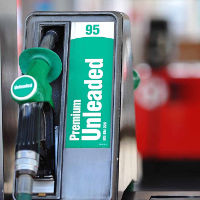
[/one_third]
[one_third]
This is the stuff you get from the gas/petrol station to fill your car. It can be a little dirty to use meaning you’ll find black residue on your stove and may need to clean it occasionally. But it is universally available all over the world and makes it very easy to find fuel for your stove, wherever you are.
[/one_third]
[one_third_last]
Other names / similar to:
Gasoline, petrol, unleaded petrol
Buy from:
Petrol/gas station
[/one_third_last]
3. Kerosene
[one_third]
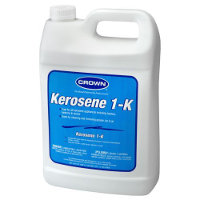
[/one_third]
[one_third]
Kerosene is a type of fuel often used in jet and rocket engines. It’s much less flammable than petrol/gasoline (i.e. harder to ignite) but generates the most energy so cooks quicker than any other fuel type.
In the UK, kerosene is known as paraffin (as, apparently, it is in Ireland, South Africa and SE Asia). However, other parts of the world, paraffin is short for paraffin wax which is something different.
[/one_third]
[one_third_last]
Other names / similar to:
Kerosene, kerosine, jet fuel, Jet-A Fuel, paraffin (UK), paraffin oil, benzine. (Not paraffin wax or benzene).
Buy from:
Hardware stores.
[/one_third_last]
4. Diesel
[one_third]
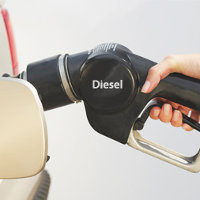
[/one_third]
[one_third]
This is the other stuff you can get from the gas/petrol station. It is usually the dirtiest of the fuels available and thus the least commonly used in multi-fuel stoves. However, it is readily available around the world so may be a useful backup. Expect to regularly clean your stove if you use diesel.
[/one_third]
[one_third_last]
Other names / similar to:
Diesel, red diesel, DERV.
Buy from:
Petrol/gas station.
[/one_third_last]
5. Butane/Propane Canisters
[one_third]
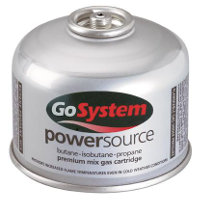
[/one_third]
[one_third]
Small metal canisters containing butane and/or propane (it doesn’t really matter which), designed for camping. The only reason these can get confused is that in the US, gasoline (petrol) is usually referred to as “gas”.
[/one_third]
[one_third_last]
Other names / similar to:
Gas canisters, camping gas, butane, propane, LPG (liquid petroleum gas).
Buy from:
Outdoor/camping shops, gardening stores, hardware stores.
[/one_third_last]
Looking for a stove to burn butane/propane canisters? See my Comparison of Canister Stoves.
6. Alcohol
[one_third] 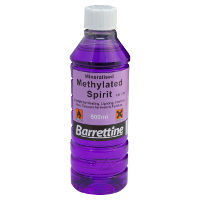
[/one_third]
[one_third]
Pure alcohol that has a strong flavour and smell (and sometimes colour) added to make it noxious. It is used in simple Trangia stoves, where it’s just poured into a pot and ignited.
None of the stoves above use alcohol as fuel. It’s included just to clarify that this is one type of liquid fuel that no multifuel stove can burn. (Although, if you’re using the Trangia X2 Multi Fuel, you could carry the original Trangia burner if you really wanted and thus, technically, be able to use alcohol).
[/one_third]
[one_third_last]
Other names / similar to:
Denatured alcohol, methylated spirits, meths, methanol, ethanol (see discussion).
Buy from:
Camping shops, hardware stores, pharmacies.
[/one_third_last]
Any questions? Add a comment below.
If you enjoyed this then you’ll probably like my other Comparison articles including Bivvy Bags, Camping Mats, Base Layer Materials and, most pertinently, Gas Canister Stoves.
[one_sixth]–[/one_sixth]
[two_third]
[vc_message message_box_style=”standard” style=”rounded” message_box_color=”info” icon_type=”fontawesome” icon_fontawesome=”fa fa-info-circle” icon_openiconic=”vc-oi vc-oi-dial”]
Buying online?
If you decide to buy a camping mat after reading this article, please do consider using one of my links.
If you do, at no cost to you, I will get a small percentage of whatever you buy.
Amazon.co.uk | Amazon.com | Alpine Trek | Blacks | Cotswold | eBay | GO Outdoors | REI | Wiggle | AllOutdoor
[/vc_message]
[/two_third]
[one_sixth_last]–[/one_sixth_last]
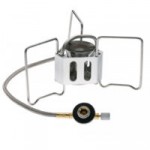
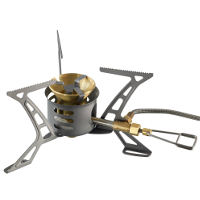
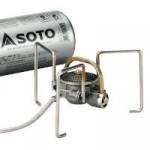
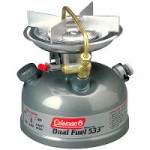
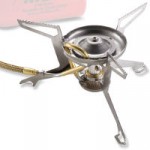
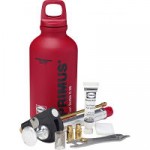
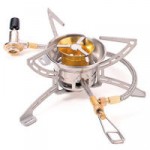
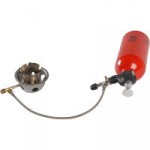
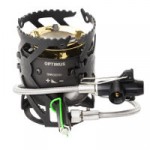
What do you think? Please do add your thoughts below…